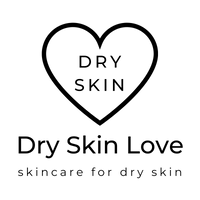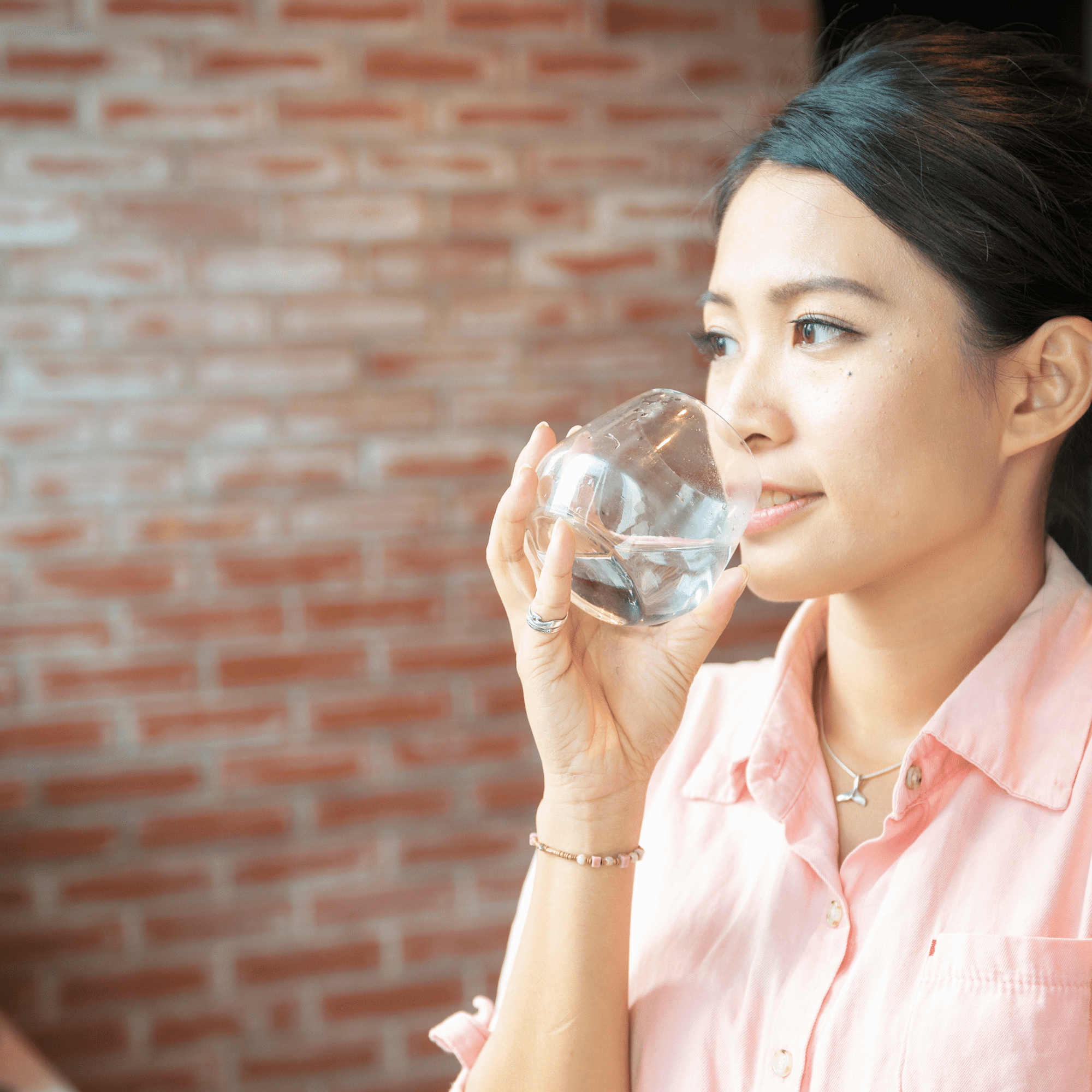
Water is essential for the normal functioning of your skin.
Dehydrated skin is dry, rough, and may scale and flake, and shows signs of premature aging.
The water content of skin is remarkably high - the outer skin layer contains more than 70% water.
Water helps maintain skin plasticity, skin barrier function and normal cell shedding.
Drinking water can increase your skin hydration, especially if you have a low water intake.
This article will discuss:
- What is dry skin?
- What is normal skin hydration?
- Water and skin cell turnover
- Many adults are inadequately hydrated
- Drinking water can increase water in the dermis
- Can drinking water help your dry skin?
- How much water should you drink for hydrated skin?
- Summary
- References
What is dry skin?
You may experience dry skin or dehydrated skin during the cold, winter months.
Dry or dehydrated skin appears dry, rough, and may scale and flake. It may also show premature signs of aging, like surface wrinkles and loss of elasticity.
Signs of severe dehydration include shriveled and dry skin that lacks elasticity and does not ‘bounce back’ when pinched into a fold (Jéquier et al, 2010).
Dry skin and dehydrated skin both develop from a lack of water and water-holding substances in the skin, called humectants. However, dry skin is also lacking fats, that are found naturally in the skin, and these essential fats can be re-introduced through skincare products and dietary changes.
Read more: What is the Dry vs. Dehydrated Skin? Fat is the Difference!
What is normal skin hydration?
Water is essential for the normal functioning of your skin.
The water content of skin is remarkably high - the epidermis (the outer skin layer) contains more than 70% water, while its outermost layer, the stratum corneum has been shown to contain ~15 - 25% water (Warner et al, 1988; Caspers et al, 2001; Caspers et al, 2003).
- It maintains plasticity of the skin, protecting it from damage.
- It contributes to optimum stratum corneum barrier function.
- It allows hydrolytic enzymes to function in the process of desquamation.
When the water content of the stratum corneum falls below 10%, scaling on the skin surface becomes visible (Rycroft, 1985).
However, it is not as simple as just drinking water, or treating your skin with water or a moisturizer.
The retention of water in the skin is dependent on:
- Natural moisturizing factors (NMFs) and other humectants (such as glycerol and hyaluronic acid) to attract and hold onto moisture.
- Intercellular lipids (fats) that form a barrier to prevent transepidermal water loss (TEWL) (Verdier-Sévrain et al, 2007).

Water and skin cell turnover
Daily insults from the environment, such as low humidity, surfactants, wind, and sun, can lower the skin's water content, causing improper desquamation and the appearance of dry, flaky skin (Verdier-Sévrain et al, 2007).
Desquamation is the natural process of shedding skin cells.
New skin cells are formed at the base layer of the skin, and they differentiate and migrate towards the skin surface, in a process that takes approximately 4 weeks. Nearly a billion cells are lost each day from the surface of adult skin (Milstone et al, 2004).
One of the critical functions of water in the skin is to participate in hydrolytic enzymatic processes required for normal desquamation.
In other words - water is necessary for the enzymes to function properly.
If the skin water content falls below a critical level, the enzymatic function required for normal desquamation is impaired, leading to skin cells sticking and building up on the skin surface (Verdier-Sévrain et al, 2007).
These changes lead to the visible appearance of dryness, roughness, scaling, and flaking (Verdier-Sévrain et al, 2007).

Many adults are inadequately hydrated
Water is involved in virtually all bodily functions.
Thus, ensuring that the body has enough water to maintain proper function is important for health.
The primary indicator of hydration status is plasma or serum osmolality (National Academies of Sciences, Engineering, and Medicine, 2005).
According to the analysis of combined urine osmolality data from the NHANES 2009–2010 and 2011–2012 surveys, about 1/3 (32.6%) of adults (ages 18–64 years old) are inadequately hydrated (Chang et al, 2016).
The importance of adequate fluid intake is also believed to maintain an adequate skin hydration (Hurlow et al, 2011).
For instance, drinking six to eight glasses of water per day is recommended to help proper skin hydration (Wolf et al, 2010).
Drinking water can increase water in the dermis
It is well-known that increased fluid intake increases the water content in the dermis layer of the skin, because the water accumulates in this layer (Eisenbeiss et al, 2001).
An increased water content in the dermis may also increase the water content in the epidermis (Brazzelli et al, 1994).

Can drinking water help your dry skin?
In 2018, Akdeniz and colleagues published a review paper analyzing 6 studies to determine whether fluid intake affects skin hydration and skin barrier function.
In an observational study there was a weak positive association between fluid intake and stratum corneum hydration (Boelsma et al, 2003).
Drinking an additional 2 L of daily water over 30 days showed an increase in both stratum corneum hydration and “deep” skin hydration, particularly when the individual’s regular diet included low amounts of water (Palma et al, 2012; Palma et al, 2015a; Palma et al, 2015b).
Another experimental study reported a slight increase in stratum corneum hydration after an additional dietary water intake of 1 L per day for a period of 42 days (Mac-Mary et al, 2006).
Overall, the evidence is weak in terms of quantity and methodological quality.
However, despite the limitations, a slight increase in stratum corneum and “deep” skin hydration was observed after additional water intake, particularly in individuals with lower prior water consumption (reviewed by Akdeniz et al, 2018).
There was also a reduction of clinical signs of dryness and roughness. Furthermore, the extensibility and elasticity of the skin increased slightly.
Unclear associations were shown between water intake and transepidermal water loss, sebum content, and skin surface pH (reviewed by Akdeniz et al, 2018).
Results showed no associations between transepidermal water loss at any skin area and an additional intake of mineral water of 1 L over 42 days (Mac-Mary et al, 2006) or 2 L over 30 days (Palma et al, 2012; Palma et al, 2015a; Palma et al, 2015b).
How much water should you drink for hydrated skin?
How much water you need varies from person to person.
For adults, the general recommendation from The U.S. National Academies of Sciences, Engineering, and Medicine is about:
- 11.5 cups (2.7 liters) a day for women
- 15.5 cups (3.7 liters) a day for men
This includes fluids from water, beverages like teas and juice, and from food.
You get an average of 19% of your water from the foods you eat.
For hydrated skin, it is best to aim for 6 - 8 glasses of water or other fluids per day, as is recommended for general health.

Summary
Does drinking water help dry skin?
Drinking water can increase your skin hydration, especially if you have a low water intake.
The possible underlying biological mechanism remains unclear.
A higher epidermal water content may change the water concentration gradient between the stratum granulosum and the outer stratum corneum cells.
However, such a simplified view may be wrong because the water content of the stratum corneum is largely determined by the natural moisturizing factors, the structure of the corneocytes and the stratum corneum intercellular lipids. It is unlikely that these parameters change due to fluid intake (reviewed by Akdeniz et al, 2018).
More research is needed to determine how increased fluid intake can increase skin hydration and decrease signs of dry skin.
For hydrated skin, it is best to aim for 6 - 8 glasses of water or other fluids per day, as is recommended for general health.
For hydrated skin, it is best to combine drinking water with proper skincare that contains humectants and essential fats such as linoleic acid.
Learn more: What is Linoleic Acid? Omega 6 Essential Fatty Acid for Dry Skin

References
Akdeniz M, Tomova-Simitchieva T, Dobos G, Blume-Peytavi U, Kottner J. Does dietary fluid intake affect skin hydration in healthy humans? A systematic literature review. Skin Res Technol. 2018 Aug;24(3):459-465.
Boelsma E, van de Vijver LP, Goldbohm RA, et al. Human skin condition and its associations with nutrient concentrations in serum and diet. Am J Clin Nutr. 2003;77:348-355.
Brazzelli V, Borroni G, Vignoli GP, et al. Effects of fluid volume changes during hemodialysis on the biophysical parameters of the skin. Dermatology. 1994;188:113-116.
Caspers PJ, Lucassen GW, Carter EA et al. In vivo confocal Raman microspectroscopy of the skin: noninvasive determination of molecular concentration profiles. J Invest Dermatol 2001; 116:434– 42.
Caspers PJ, Lucassen GW, Puppels GJ. Combined in vivo confocal Raman spectroscopy and confocal microscopy of human skin. Biophys J 2003 July; 85: 572-80.
Chang T., Ravi N., Plegue M.A., Sonneville K.R., Davis M.M. Inadequate Hydration, BMI, and Obesity Among US Adults: NHANES 2009–2012. Ann. Fam. Med. 2016;14:320–324.
Eisenbeiss C, Welzel J, Eichler W, et al. Influence of body water distribution on skin thickness: measurements using high-frequency ultrasound. Br J Dermatol. 2001;144:947-951.
Fowler J. Understanding the Role of Natural Moisturizing Factor in Skin Hydration. Practical Dermatology. 2012; July. 36-40.
Hurlow J, Bliss DZ. Dry skin in older adults. Geriatr Nurs. 2011;32:257-262.
Jéquier, E., & Constant, F. Water as an essential nutrient: the physiological basis of hydration. European journal of clinical nutrition. 2010. 64(2), 115-123.
Kenney E.L., Long M.W., Cradock A.L., Gortmaker S.L. Prevalence of Inadequate Hydration among US Children and Disparities by Gender and Race/Ethnicity: National Health and Nutrition Examination Survey, 2009–2012. Am. J. Public Health. 2015;105:e113–e118.
Liska D, Mah E, Brisbois T, Barrios PL, Baker LB, Spriet LL. Narrative Review of Hydration and Selected Health Outcomes in the General Population. Nutrients. 2019 Jan 1;11(1):70.
Mac-Mary S, Creidi P, Marsaut D, et al. Assessment of effects of an additional dietary natural mineral water uptake on skin hydration in healthy subjects by dynamic barrier function measurements and clinic scoring. Skin Res Technol. 2006;12:199-205.
National Academies of Sciences, Engineering, and Medicine. Dietary Reference Intakes for Water, Potassium, Sodium, Chloride, and Sulfate. Washington, DC: The National Academies Press. 2005.
Palma L, Marques LT, Bujan J, et al. Dietary water affects human skin hydration and biomechanics. Clin Cosmet Investig Dermatol. 2015a;8:413-421.
Palma ML, Tavares L, Fluhr JW, et al. Positive impact of dietary water on in vivo epidermal water physiology. Skin Res Technol. 2015b;21:413-418.
Palma L, Marques LT, Bujan J, et al. Relationship between the dietary intake of water and skin hydration. Biomed Biopharm Res, 2012; 2: 173-181.
Rycroft RJ. Low humidity and microtrauma. Am J Ind Med 1985; 8:371–3.
Verdier-Sévrain S, Bonté F. Skin hydration: a review on its molecular mechanisms. J Cosmet Dermatol. 2007 Jun;6(2):75-82.
Warner RR, Myers MC, Taylor DA. Electron probe analysis of human skin: determination of the water concentration profile. J Invest Dermatol 1988; 90: 218–24.
Wolf R, Wolf D, Rudikoff D, et al. Nutrition and water: drinking eight glasses of water a day ensures proper skin hydration-myth or reality? Clin Dermatol. 2010. 28:380-383.
Author Information

Dr. Natasha Ryz is a scientist, skin care expert and an entrepreneur. She is the founder of Dry Skin Love Skincare, and she creates skincare products for beauty, dry skin and pain relief.
Dr. Ryz has a PhD in Experimental Medicine from the University of British Columbia in Vancouver, and she is a Vanier scholar. She also holds a Master of Science degree and a Bachelor of Science degree from the University of Manitoba in Winnipeg.
Natasha is the former Chief Science Officer of Zenabis Global, and she oversaw cannabis extraction, analytics, and product development. Her team brought 20 products to market including oils, sprays, vapes and softgels.
Why I Started A Skincare Company

